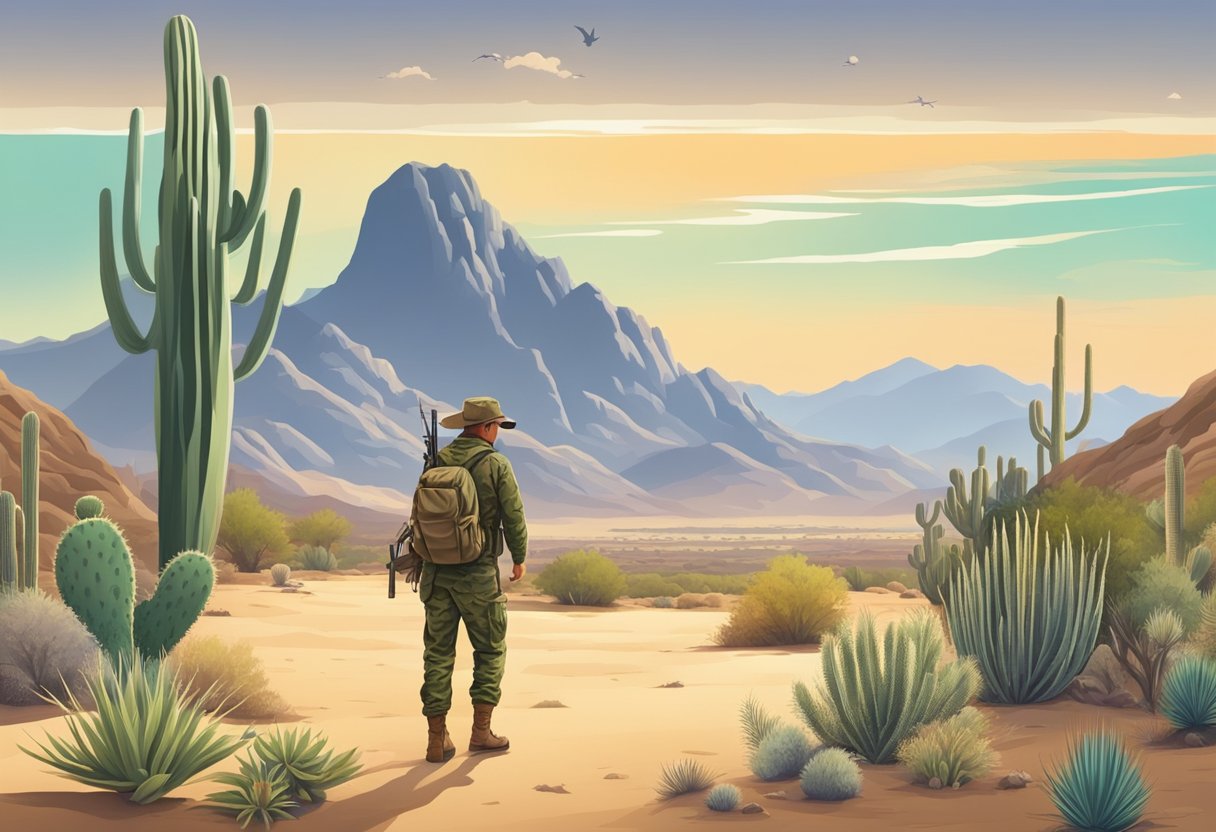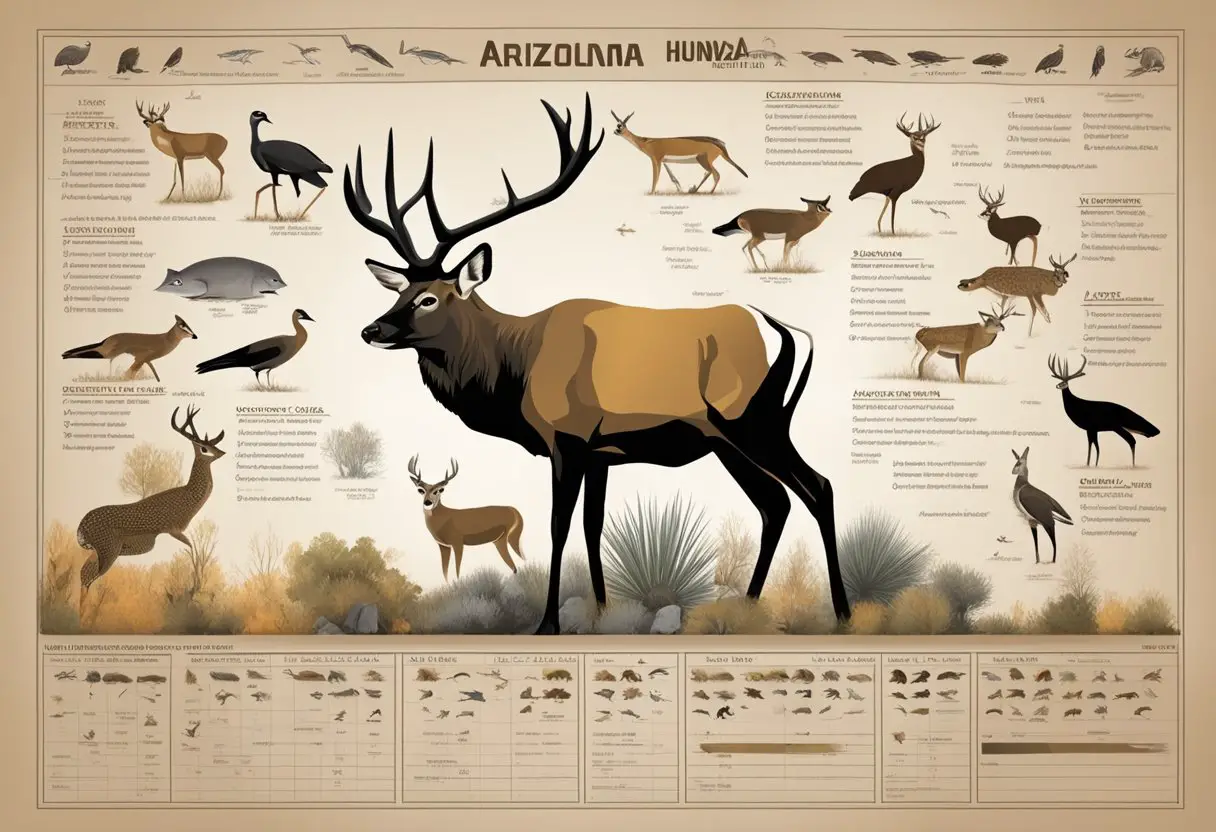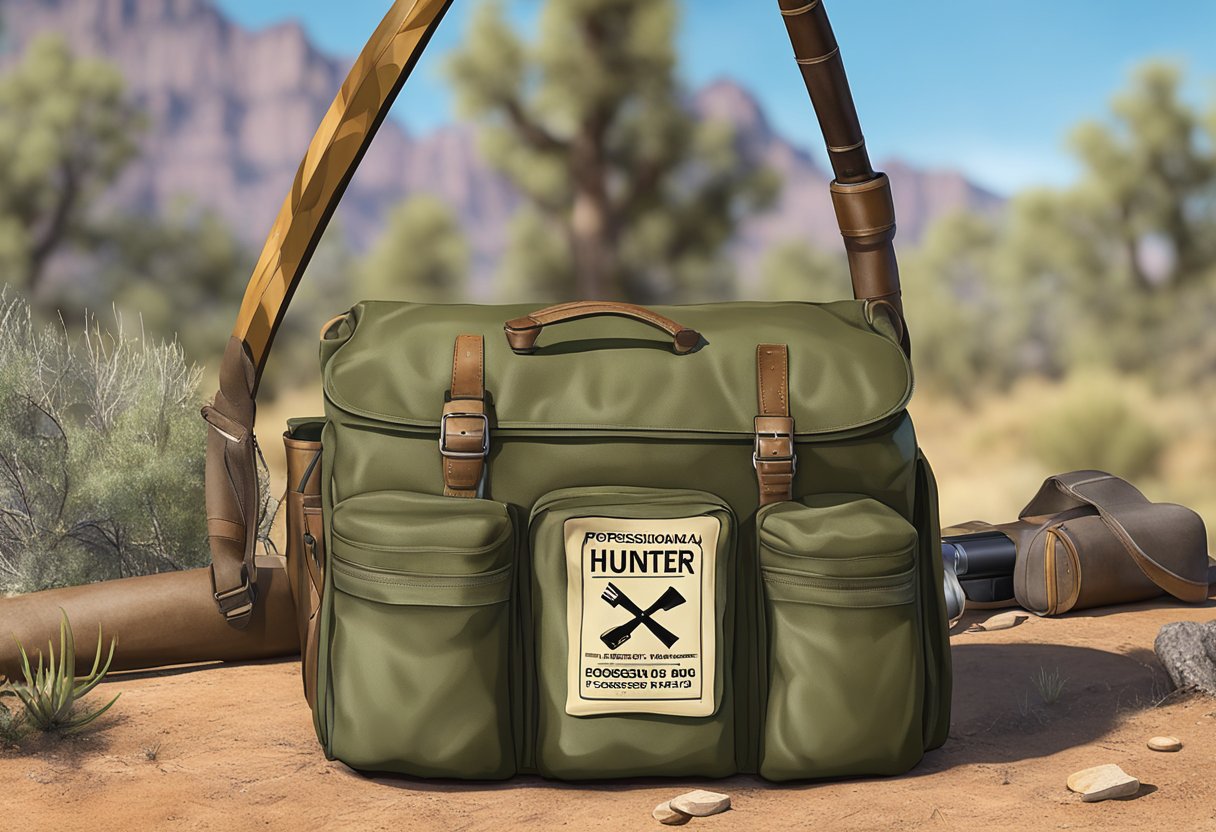Arizona’s diverse landscapes, from forests to deserts, present hunters with opportunities to pursue a variety of wildlife. The Arizona Game & Fish Department (AZGFD) oversees the hunting regulations which are designed to manage wildlife populations sustainably and provide a fair chance for hunters to harvest game. These regulations encompass everything from season dates and bag limits to hunting education and licenses. It’s important for every hunter, whether experienced or new to the field, to familiarize themselves with these rules to ensure a legal and ethical hunting experience.
For the most up-to-date information, see this.

Understanding Arizona hunting regulations is crucial for conservation efforts and maintaining the balance of ecosystems. Regulations evolve to adapt to wildlife population changes, hunter feedback, and research by wildlife biologists. The frequently updated rules cover specific requirements for various species, including big game like elk and deer, as well as small game. Season dates define when hunting is permitted, and permits and draw information determine the legal procedures for tag allocation. These measures aim to allow hunters to enjoy their sport while protecting Arizona’s natural resources for future generations.
Key Takeaways
- Arizona hunting regulations manage wildlife sustainably and ensure ethical hunting.
- Regulations are updated to reflect changes in wildlife populations and conservation research.
- Hunters must adhere to specific season dates, permits, and legal procedures to hunt in Arizona.
Table of Contents
General Arizona Hunting Regulations
Arizona’s hunting regulations are designed to manage wildlife sustainably and ensure the safety of all participants. Adherence to the laws is enforced rigorously to maintain the state’s rich hunting heritage. The following subsections outline the key regulatory details every hunter must know before heading out into the field.
Hunting License Requirements
In Arizona, individuals must obtain a hunting license to legally hunt wildlife. This involves completing a hunter education course for first-time hunters or those who do not possess a valid license from another state. Different licenses and permits are required for various game species, and all are subject to compliance with Arizona hunting laws.
Legal Firearms and Ammunition
Hunters can use a variety of firearms and ammo depending on the game and season. It’s important to review the current year’s hunting regulations to understand the legal weapons that can be used, as rules can vary by region and species. Safety is paramount, so choosing the appropriate firearm and ammunition is essential for ethical hunting.
Hunting Methods and Safety
Public safety is a top priority, dictating which hunting methods are acceptable. The use of traps or electronic calling devices may have specific rules. Survival skills and hunt safe practices, including proper firearm handling and wearing blaze orange, are crucial aspects taught in the mandatory hunter education courses.
Trespassing and Respect for Land
Hunters must respect private property and always acquire consent to hunt on private land. It’s critical to be aware of the boundaries and not trespass. Additionally, reporting violations through Operation Game Thief supports the enforcement of regulations and helps protect Arizona’s wildlife and habitats for future generations. Cooperation with local authorities is expected for all who enjoy the privileges of Arizona hunting.
Seasons and Dates

In Arizona, hunting season dates are clearly established for various game categories, each with specific start and end times during the year. This structured approach ensures that wildlife management and conservation efforts align with hunters’ activities.
Big Game Seasons
Arizona’s big game seasons are governed by a big game draw system to ensure sustainable wildlife populations. Each big game species, such as deer, has its own set of season dates, which are crucial for hunters to adhere to.
- Deer: Archery – August 20 to September 9; General – October 22 to November 5
- Elk: Archery – September 10 to September 24; General – November 12 to November 25
Small Game Seasons
Small game in Arizona includes species such as quail, squirrel, and rabbit. Each small game season has specific dates, though generally, they offer longer hunting periods.
- Quail: October 15 to February 6
- Squirrel: October 1 to December 31
Migratory Game Bird Seasons
Migratory game bird seasons cover waterfowl and other bird species that cross state lines during their natural migration patterns. The season dates for migratory game birds, notably ducks, are set within federal frameworks.
- Waterfowl/Ducks: Northern Zone – October 15 to January 30; Southern Zone – November 6 to February 5
Trapping Seasons
Trapping seasons in Arizona are subject to strict trapping regulations to balance the needs of wildlife, their habitats, and trappers. Season dates for trapping are defined for the safe and responsible capture of applicable species.
- Furbearer Trapping: November 1 to March 15
Species-Specific Regulations

Arizona hunting regulations are tailored to each species to ensure conservation and population control. These rules are critical for maintaining a balanced ecosystem and providing hunters with fair-chase opportunities.
Deer Hunting
In Arizona, hunters pursuing deer must distinguish between mule deer and white-tailed deer, as regulations vary. For example, deer seasons often differ with limited entry tags issued for more sought-after areas. Mule deer are prevalent throughout the state, while white-tailed deer tend to be located in the southeastern regions.
Elk and Pronghorn
Both elk and pronghorn are categorized as big-game species, and hunting opportunities for these animals involve a draw process due to their popularity and management needs. Seasons and tag allocations are carefully established based on surveys and population objectives.
Bear and Mountain Lion
Hunting regulations for North American bears, including black bears, and mountain lions, are stringent, involving specific season dates and immediate reporting requirements upon harvest. Zones may close earlier than scheduled if quota limits are reached.
Small Game and Waterfowl
Small game species such as rabbit, quail, and dove, along with waterfowl like ducks, have less restrictive regulations compared to big game, but hunters must still adhere to season dates and bag limits. Waterfowl hunters must also possess a federal migratory bird stamp.
Other Species
Species such as turkey, bighorn sheep, buffalo, and coyote come with their own unique regulations. Turkey and bighorn sheep permits are typically distributed through a lottery system, while buffalo hunts are rare and thus highly controlled. Coyote, classified as a furbearer, does not require a tag but has specific season dates and regulations to follow.
Permits and Draw Information
Arizona’s hunting landscape offers diverse opportunities, and securing the correct permits is essential for legal and responsible wildlife management. The Arizona Game & Fish Department (AZGFD) oversees the issuance of hunting permits, primarily through a draw system for big game hunts.
Big Game Draw System
The Big Game Draw in Arizona is a lottery-like process necessary for hunters wishing to pursue big game species, such as antelope, moose, and fall bear. The draw regulates the number of hunters in open areas, ensuring sustainable wildlife populations and fair chase standards. Permit application deadlines are strictly enforced, and hunters must apply through the AZGFD portal, where they can also find season dates and application details.
Specialty Permits
In addition to the regular permits, Arizona offers specialty permits for unique hunting experiences. These include permits for raptor capture, which are highly regulated due to the sensitive nature of the species, and limited-entry hunts such as the fall bison and spring turkey seasons. These specialty permits often have separate application processes and deadlines, which are detailed in the regulations provided by the AZGFD.
Licenses and Fees
The Arizona hunting landscape requires specific licenses and permits, each with associated fees that vary based on residency status and hunter classification. Navigating these requirements is essential for law-abiding hunting.
Resident vs. Non-Resident
Residents of Arizona are privileged with lower fees for hunting licenses compared to non-residents. The Arizona Game & Fish Department (AZGFD) mandates that residents must present proof of residency when purchasing a hunting license. On the other hand, non-residents must adhere to distinct licensing requirements and should expect higher associated fees.
License and Permit Costs
The costs for hunting licenses and permits are structured as follows:
- General Hunting License: Essential for all hunters, the price for this license is contingent upon whether one is a resident or a non-resident.
- Combination Hunt and Fish License: Offers a bundled option for those interested in both activities.
- Big Game Tags: Separate fees are required for big game permits, which are distributed through a lottery system.
For detailed fee structures, one must consult the Hunting Licenses & Fees page for the most current rates.
Discounts and Special Licenses
Special populations such as youth, senior residents, and veteran hunters might be eligible for discounted licenses or special permits:
- Youth Licenses: Typically offered at a lower rate to encourage young hunters.
- Veteran and Senior Discounts: Honoring their service and commitment, veterans and seniors may find they qualify for discounted hunting licenses.
- Complimentary Licenses: Under certain conditions, some hunters may be granted licenses at no cost.
In all instances, a valid license is required to hunt legally in Arizona, and these licenses and permits are critical for the funding of wildlife management and conservation efforts.
Bag and Possession Limits

Arizona’s hunting regulations define specific bag and possession limits for various game categories. Adherence to these limits is crucial for the sustainability of wildlife populations and the integrity of the hunting experience.
Big Game Limits
Big game hunters in Arizona are generally limited to one deer per calendar year, with requirements for a valid hunting license and a deer tag. For specific big game species, hunters should consult the Arizona Game and Fish Commission Orders to determine the exact bag and possession limits applicable to their hunt.
Small Game Limits
For small game, the bag and possession limits vary by species and are detailed in the state’s hunting regulations. Small game species include animals like squirrels and rabbits. Hunters need to verify the limits for each small game species they plan to pursue. For more information, reviewing the season dates and hunting areas may provide clarity on the defined limits.
Waterfowl Limits
When hunting waterfowl such as ducks, Arizona enforces specific bag limits to maintain healthy populations. The state’s waterfowl hunters are obliged to comply with migratory bird regulations, which set forth daily and seasonal bag limits. These regulations are amended periodically, and it is recommended that hunters confirm the current Waterfowl and Snipe Regulations before their hunting expeditions.
Game Management and Conservation
The Arizona Game & Fish Department actively engages in meticulous game management and conservation to sustain the state’s wildlife populations. Ensuring the balance between wildlife, habitat, and hunting activities underscores Arizona’s commitment to its natural resources.
Wildlife Management Units
Arizona is divided into various Wildlife Management Units (WMUs), which are specific geographic areas designed to facilitate effective management of game species. Each WMU has tailored regulations to address the unique ecological needs of the area and its wildlife. For example, regulations specific to each WMU guide hunters on season dates and bag limits to ensure populations remain healthy.
Species Conservation Programs
The Arizona Game and Fish Department oversees numerous species conservation programs to support and recover vulnerable wildlife. Initiatives include habitat enhancement, scientific research, and reintroduction efforts. Programs like the Hunt Guidelines Process provide a framework for decision-making, incorporating data from hunter harvest reporting and game surveys.
Hunting and Habitat Preservation
Conservation methods are employed to maintain viable habitats crucial for the survival of game species in Arizona. The department emphasizes the importance of habitat preservation through hunting regulations, which directly influence the conservation of species and their ecosystems. Hunters are critical to these efforts, providing funding and actively participating in maintaining the delicate balance within these ecosystems, protecting the future of hunting in Arizona.
Education and Outreach
The Arizona Game and Fish Department emphasizes the importance of informed and responsible hunting through its education and outreach programs, focusing on hunter education courses, youth and new hunter programs, and teaching about ethics and legal responsibilities.
Hunter Education Courses
The Arizona Game and Fish Department offers comprehensive hunter education courses that cover a variety of topics crucial for public safety and hunting success. These courses address not only the basic mechanics of hunting but also incorporate Arizona’s hunting history and the significance of wildlife management and conservation. Emphasis is placed on ethical hunting practices to ensure wildlife violations are minimized.
Youth and New Hunter Programs
Outreach efforts are designed to support and educate young and novice hunters. Through the Mentored Hunt Camp and the Outdoor Skills Network, beginners can engage in field events to gain practical hunting skills. These initiatives provide hands-on learning experiences, promoting a deeper understanding of Arizona’s hunting regulations and fostering a lifelong appreciation for hunting traditions.
Ethics and Legal Responsibilities
An understanding of the ethical considerations and legal responsibilities is paramount for all hunters. The department thoroughly covers laws and ethical hunting behavior to ensure adherence to regulations and to prevent wildlife violations. It strives to instill an ethos of respect for nature, fellow hunters, and non-hunters alike, ensuring a safe and sustainable hunting environment for future generations.
Additional Resources and Information
For hunters seeking comprehensive guidelines and assistance, the following resources provide valuable information on the nuances of Arizona hunting regulations.
Arizona Game and Fish Department
The Arizona Game and Fish Department is the primary authority when it comes to hunting in the state. It offers detailed annual booklets that encompass season dates, bag limits, hunt types, and other necessary requirements for hunting most wildlife, including big and small game. The department’s website is an indispensable tool for understanding legal hunting practices in Arizona.
Hunting Area Guides
For specific information on hunting areas and open areas, the eRegulations website hosts official Arizona hunting regulations and area guides. These guides are vital for hunters to ensure they are in compliance with designated area rules, providing up-to-date details on where hunting is permitted within the state.
Reporting and Compliance
The Arizona Game and Fish Department runs Operation Game Thief, a program inviting the public to report wildlife violations. The department’s website offers procedures for reporting infractions, helping to maintain legal and ethical hunting practices. Compliance with regulations is critical for the conservation of Arizona’s natural resources and maintaining the integrity of its diverse ecosystems.
Frequently Asked Questions

Navigating the nuances of Arizona’s hunting regulations can ensure a successful and legal hunting season. The following FAQs address common inquiries regarding hunting in Arizona.
What are the requirements for obtaining a hunting license in Arizona?
Individuals aiming to hunt in Arizona must first obtain a valid hunting license, which requires completing a hunter education course if they were born after January 1, 1961. Licenses can be purchased through the Arizona Game and Fish Department.
Which animals are permissible to hunt without a license in Arizona?
Most wildlife in Arizona requires a license to hunt. However, certain non-protected species and nuisance wildlife may be hunted without a license on private property with the landowner’s permission.
During which periods are the designated hunting seasons for elk in Arizona?
Elk hunting seasons in Arizona are determined by the Game and Fish Department and can vary, usually falling in the fall and winter months. Specific dates are published annually in the hunting regulations.
What are the bag limits and regulations for deer hunting in Arizona?
The bag limits and regulations for deer hunting, including season dates and hunting areas, are outlined in the official Arizona hunting regulations. Deer hunters must adhere to strict bag limits and zone regulations.
Are there restrictions on the number of rounds in a firearm for hunting in Arizona?
Arizona imposes no general state restriction on the number of rounds a firearm magazine can hold for hunting. However, hunters should verify regulations for specific game or management units where different rules may apply.
Can landowners hunt on their private property without a license in Arizona?
Landowners in Arizona still require a license to hunt most wildlife on their property. However, as mentioned, certain animals may be hunted without a license when causing damage or creating a nuisance.